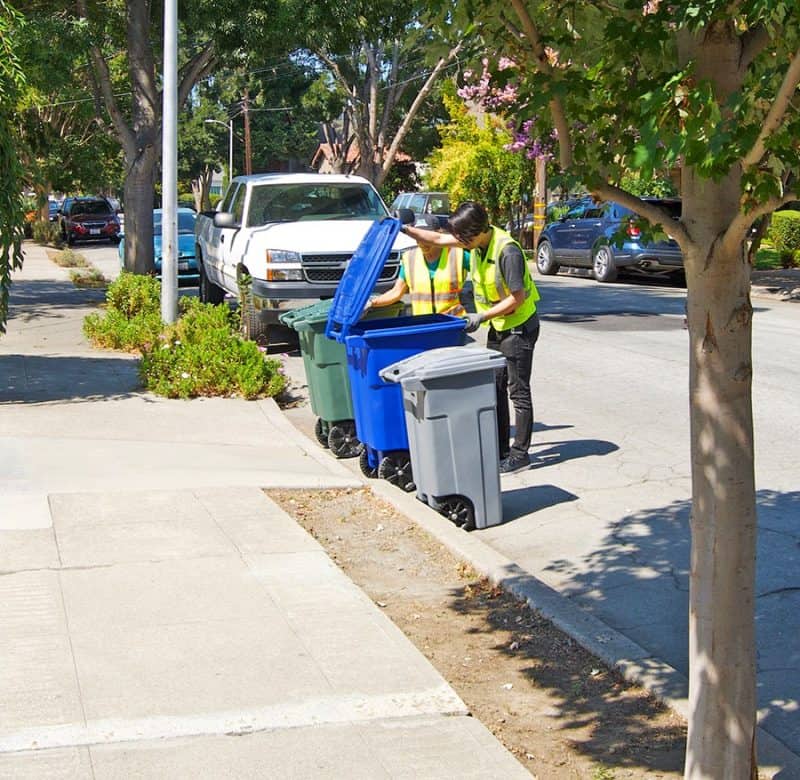Don’t say they didn’t warn us. Garbage monitors soon will be traversing our neighborhoods, digging into our bins to make sure we are properly sorting our trash, recyclables, and compost—and putting each in the correct bin. We’ll know who the trash cops are because they’ll be wearing yellow vests, the City of Alameda said in a Facebook post on Thursday, September 8.

These “container reviews,” ordered by Alameda County Industries (ACI), are now required by state law, according to the City’s post. And lest we don’t take the yellow vests seriously, there will be consequences. “If [the garbage monitors] find bins with prohibited items (for example, if recyclables or food scraps are found in the trash, or if plastic or glass are found in the green organics bin), ACI will contact the customer so they can correct the issue going forward,” the City warned.
Sorting may seem simple, but it’s not always as straightforward as one might think. According to the long multi-colored list provided by Alameda Sorts, for example, a newspapers go into the blue recyclables bin—unless you spill some food or coffee on them, in which case they go in the green compost bin. Pay attention, now. Cosmetic containers with residue go in the gray trash bin, but empty aerosol hair spray cans go in the blue recyclables bin—residue or not. Hopefully the yellow vests go after more obvious offenses.
Shared trashcans pose challenge for garbage monitors
As might be predicted, some people responded to the City’s Facebook post about trash cops with less than full enthusiasm, especially when it’s tough to know who to hold accountable for that fruit fly invasion in a shared trash bin. “I often see stuff that doesn’t belong in the compost bin and compostables in the garbage bin shared by five apartments,” Priscilla commented. Upon whose door will the yellow vests be knocking if they find a problem? How will they know who actually dumped the errant garbage into the wrong bin? “If someone is recycling trash according to your guidance and then others are sneaking their items to whatever bin, then what? Is it still the owner’s responsibility?” asked Dorota. Judging by the number of similar comments, tossing trash into other people’s bins is not an uncommon occurrence around town.
Community expresses mixed reactions to trash cops
Some commenters were uncertain—or even skeptical—about the number of items in the blue bins that actually get recycled, even after meticulous sorting. “Can you give us the stats on how much of our recyclables are being recycled these days?” Maggie asked. “And do we now need to rinse them clean? I want to be good on this because it’s important, but I also want to make sure I’m not wasting effort.” Others expressed similar concerns. “I’ve heard that roughly 80 percent of what goes into the blue recycle can ends up in the landfill anyway,” Tahd replied.
Despite the many questions and the few who complained that “Big Brother is watching you,” most commenters expressed a desire to deal with our garbage in a responsible way. “Bring it!” Kim wrote. “We are extremely good at our recycling.”
Finally, Katie asked what many of us would love to know: “Can we finally get our broken bins replaced?” Good luck with that.
Liz Barrett is the Copy Editor of the Alameda Post and writes about the community. Contact her via [email protected]. Her writing is collected at AlamedaPost.com/Liz-Barrett.



